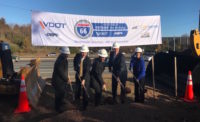Completion of a privately financed 10-mile extension of Virginia’s Interstate 95 express lanes will be pushed past the originally scheduled Oct. 2022 completion deadline, as the state’s toll road operator and contractor work to determine responsibility for addressing geologic conditions that have slowed progress on the $565-million project.
The dispute centers on responsibility for handling the large amounts of highly plastic clay and silt material that were discovered in the corridor’s soils after construction began in 2019. This past October, an arbitrator ruled that the Branch Civil/Flatiron construction joint venture (BFJV) was entitled to an adjustment of its contract with Transurban, which operates the I-95 express lanes for the Virginia Dept. of Transportation. A second arbitration hearing scheduled for Jan. 2022 will resolve the level of cost and schedule relief BFJV will receive. Both sides have agreed to abide by the outcome and not pursue further litigation.
Although construction has continued on other facets of the project that extends the express lanes from the current terminus to just north of Fredericksburg, neither Transurban nor VDOT have determined what new construction approaches may be needed, or how much additional time may be required for the new lanes to open.
In 2015, Transurban completed the conversion of I-95’s existing HOV-only lanes into a dynamically tolled 29-mile express lane system that was subsequently augmented with the 8-mile I-395 corridor between the Beltway and Washington, DC. Along with operating and maintaining the I-95/I-395 toll lanes through 2087, Transurban is also building a 3-mile northern extension to the I-495/Beltway express lanes it operates under a separate concession for VDOT.
Earlier this year, Maryland tapped a Transurban-led team for a progressive public-private partnership initiative to develop a complementary express lanes network for portions of the Beltway and I-270, including an expanded Potomac River crossing.


.jpg?height=200&t=1651809110&width=200)


Post a comment to this article
Report Abusive Comment